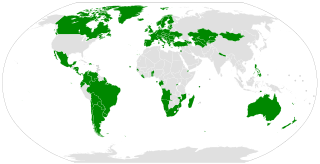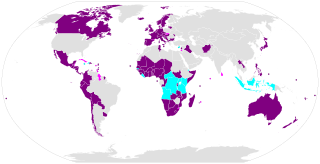External links
- Full text of the treaty – International Committee of the Red Cross
- List of state parties, un.org.
- New law aims to end cluster bomb devastation – ABC News Online
The Protocol on Explosive Remnants of War is an international treaty concluded in Geneva in 2003 that aims to limit the impact of cluster bombs and other unexploded devices on civilian populations after a conflict ends. It is the fifth Protocol to the Convention on Prohibitions or Restrictions on the Use of Certain Conventional Weapons.
The Protocol came into effect on 12 November 2006. As of May 2024, there are 98 state parties to the agreement.

The Convention on Biological Diversity (CBD), known informally as the Biodiversity Convention, is a multilateral treaty. The Convention has three main goals: the conservation of biological diversity ; the sustainable use of its components; and the fair and equitable sharing of benefits arising from genetic resources. Its objective is to develop national strategies for the conservation and sustainable use of biological diversity, and it is often seen as the key document regarding sustainable development.
Arms control is a term for international restrictions upon the development, production, stockpiling, proliferation and usage of small arms, conventional weapons, and weapons of mass destruction. Historically, arms control may apply to melee weapons before the invention of firearm. Arms control is typically exercised through the use of diplomacy which seeks to impose such limitations upon consenting participants through international treaties and agreements, although it may also comprise efforts by a nation or group of nations to enforce limitations upon a non-consenting country.
The Protocol for the Prohibition of the Use in War of Asphyxiating, Poisonous or other Gases, and of Bacteriological Methods of Warfare, usually called the Geneva Protocol, is a treaty prohibiting the use of chemical and biological weapons in international armed conflicts. It was signed at Geneva on 17 June 1925 and entered into force on 8 February 1928. It was registered in League of Nations Treaty Series on 7 September 1929. The Geneva Protocol is a protocol to the Convention for the Supervision of the International Trade in Arms and Ammunition and in Implements of War signed on the same date, and followed the Hague Conventions of 1899 and 1907.

A cluster munition is a form of air-dropped or ground-launched explosive weapon that releases or ejects smaller submunitions. Commonly, this is a cluster bomb that ejects explosive bomblets that are designed to kill personnel and destroy vehicles. Other cluster munitions are designed to destroy runways or electric power transmission lines.

The law of war is the component of international law that regulates the conditions for initiating war and the conduct of hostilities. Laws of war define sovereignty and nationhood, states and territories, occupation, and other critical terms of law.
International humanitarian law (IHL), also referred to as the laws of armed conflict, is the law that regulates the conduct of war. It is a branch of international law that seeks to limit the effects of armed conflict by protecting persons who are not participating in hostilities and by restricting and regulating the means and methods of warfare available to combatants.

The United Nations Convention on Certain Conventional Weapons, concluded at Geneva on October 10, 1980, and entered into force in December 1983, seeks to prohibit or restrict the use of certain conventional weapons which are considered excessively injurious or whose effects are indiscriminate. The full title is Convention on Prohibitions or Restrictions on the Use of Certain Conventional Weapons Which May Be Deemed to Be Excessively Injurious or to Have Indiscriminate Effects. The convention covers land mines, booby traps, incendiary devices, blinding laser weapons and clearance of explosive remnants of war.
The Cluster Munition Coalition (CMC) is an international civil society movement, which campaigns against the use, production, stockpiling, and transfer of cluster munitions. Cluster munitions, a type of munition stockpiled by more than 80 states, are documented to have caused significant civilian deaths and injuries and have frequently caused indiscriminate effects in both conflict and peace times. Their use is prohibited under the 2008 Convention on Cluster Munitions, a convention formally endorsed on May 30, 2008, in Dublin, Ireland, and was signed by 94 countries in Oslo on December 3-4, 2008. The Convention entered into force, becoming binding upon state parties to the convention on August 1, 2010, after 30 countries formally ratified it. As of January 4, 2012, it had been signed by 111 countries, of which 77 have ratified.

The African Nuclear-Weapon-Free Zone Treaty, also known as the Treaty of Pelindaba, establishes a Nuclear-Weapon-Free Zone in Africa. The treaty was signed in 1996 and came into effect with the 28th ratification on 15 July 2009.

The Second Optional Protocol to the International Covenant on Civil and Political Rights, aiming at the abolition of the death penalty, is a subsidiary agreement to the International Covenant on Civil and Political Rights. It was created on 15 December 1989 and entered into force on 11 July 1991. As of April 2022, the Optional Protocol has 90 state parties. The most recent country to ratify was Kazakhstan, on 24 March 2022.

The Convention on Cluster Munitions (CCM) is an international treaty that prohibits all use, transfer, production, and stockpiling of cluster munitions, a type of explosive weapon which scatters submunitions ("bomblets") over an area. Additionally, the convention establishes a framework to support victim assistance, clearance of contaminated sites, risk reduction education, and stockpile destruction. The convention was adopted on 30 May 2008 in Dublin, and was opened for signature on 3 December 2008 in Oslo. It entered into force on 1 August 2010, six months after it was ratified by 30 states. As of December 2023, a total of 124 states are committed to the goal of the convention, with 112 states that have ratified it, and 12 states that have signed the convention but not yet ratified it.a

An explosive weapon is a weapon that uses an explosive to project blast and/or fragmentation from a point of detonation.

The Geneva Conventions are international humanitarian laws consisting of four treaties and three additional protocols that establish international legal standards for humanitarian treatment in war. The singular term Geneva Convention colloquially denotes the agreements of 1949, negotiated in the aftermath of the Second World War (1939–1945), which updated the terms of the two 1929 treaties and added two new conventions. The Geneva Conventions extensively define the basic rights of wartime prisoners, civilians and military personnel; establish protections for the wounded and sick; and provide protections for the civilians in and around a war-zone.
Capital punishment is no longer applied in San Marino: the last execution was carried out in 1468 or in 1667, by hanging.
The Protocol on Prohibitions or Restrictions on the use of Incendiary Weapons is a United Nations treaty that restricts the use of incendiary weapons. It is Protocol III to the 1980 Convention on Certain Conventional Weapons Which May Be Deemed To Be Excessively Injurious Or To Have Indiscriminate Effects. Concluded in 1981, it entered into force on 2 December 1983. As of January 2023, it had been ratified by 126 state parties.
Capital punishment has been abolished in Bolivia and is no longer a lawful punishment in the country. It was abolished for ordinary crimes in 1997, and for all crimes in 2009. Bolivia's last execution was of Melquiades Suxo on 30 August 1973.
Capital punishment was abolished in Colombia by constitution in 1910. In prohibiting the death penalty, the Colombian Constitution of 1991 states "The right to life is inviolable. There will be no death penalty." The last person to be legally executed in Colombia was Manuel Saturio Valencia by firing squad on 5 May 1907 for arson.
Capital punishment was abolished in the Republic of the Congo in 2015. The country carried out its last execution in 1982. Before the abolition of the death penalty, the Republic of the Congo was classified as "Abolitionist in Practice." The Republic of the Congo is not a state party to the Second Optional Protocol to the International Covenant on Civil and Political Rights.
Capital punishment was abolished in Guinea. The civilian death penalty was abolished in 2016. It was abolished under military law in 2017. Guinea carried out its last execution in 2001. Prior to its abolition for ordinary crimes in 2016, Guinea was classified as retentionist.